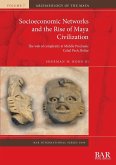At the beginning of the 18th century the west of Scotland was a relatively poor region. Most people lived a hand to mouth existence, at the mercy of the weather. By the end of the century the region was on the way to becoming a major economic power. This was not just in Scotland, Britain and Europe, but on a global scale. The changes which took place often come under the term 'Industrial Revolution' and have been the subject of many general studies. Despite this attention, remarkably little has been done on what was actually happening at local or regional level. In effect, the history has been written back to front, with most interest given to the general trends, and very little to the more time consuming groundwork. This work investigates why, by the end of the eighteenth century, Renfrewshire had become one of three principal cotton manufacturing regions in Britain, and one of the first factory-type industrial regions in the world. The reasons behind this were by no means confined to cotton mills. The success could not have occurred without extensive earlier changes including to agriculture, population and settlement pattern, and the story of these is also uncovered in this study.
Hinweis: Dieser Artikel kann nur an eine deutsche Lieferadresse ausgeliefert werden.
Hinweis: Dieser Artikel kann nur an eine deutsche Lieferadresse ausgeliefert werden.








